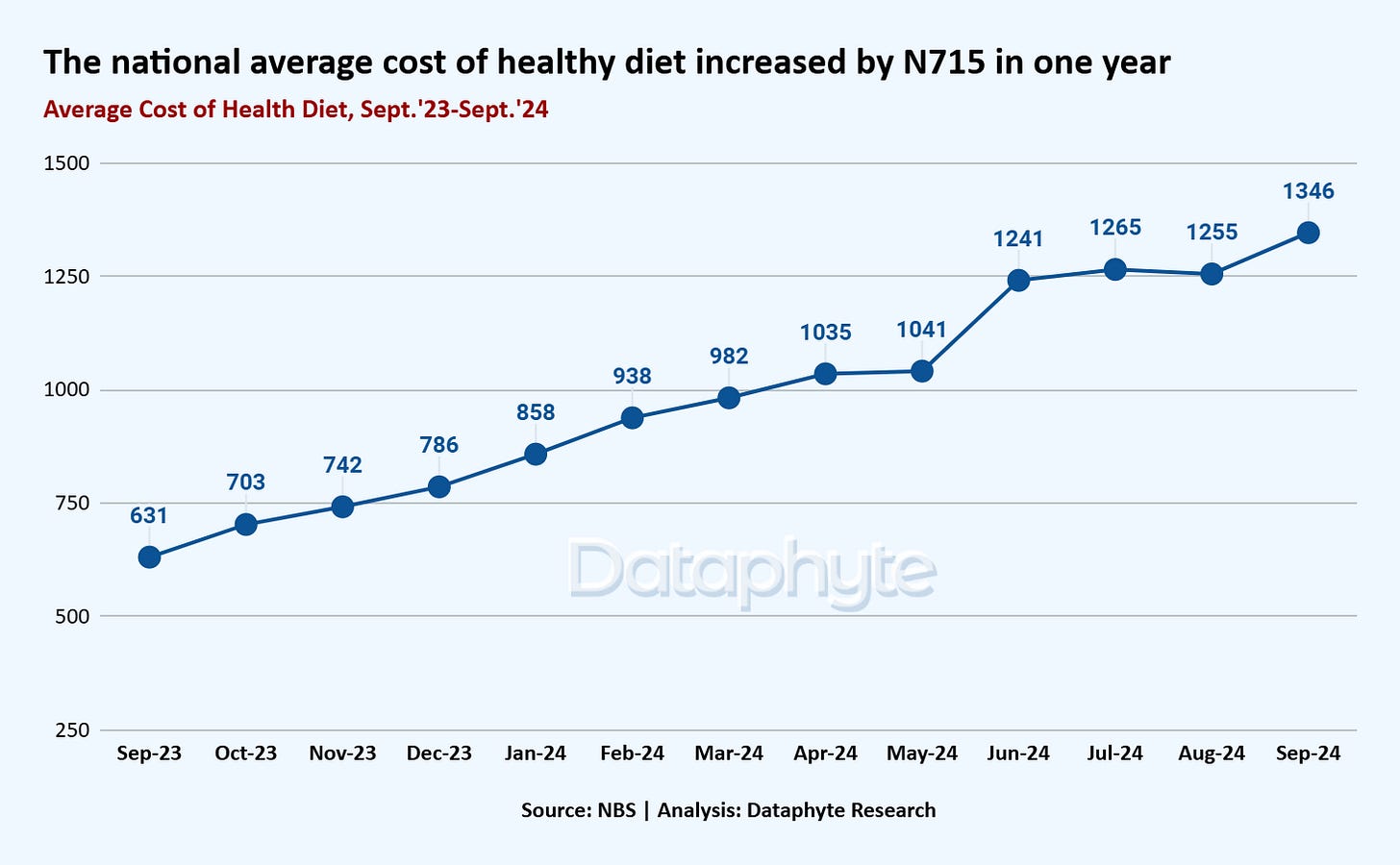In January 2025, the Federal Government announced a 50% increase in the daily feeding allowance for inmates in Nigerian correctional facilities, raising it from ₦750 to ₦1,125 per inmate. The Minister of Interior, Olubunmi Tunji-Ojo, directed the Nigerian Correctional Service (NCoS) to ensure that the additional funds translate into better meals and healthier living conditions for inmates.
However, the government’s increase in feeding allowance was necessary but insufficient. The cost of a healthy diet in Nigeria stood at ₦1,346 per day in 2024, exceeding the new allocation by ₦221. This price gap raises concerns about whether the additional funding can address malnutrition and food shortages in prisons.
Over the past decade, Nigeria’s prison population has surged. According to World Relief Brief, the prison population grew by 38% in 2018 and 35% in 2022. While there is no recent data to show the growth rate between 2022 and 2024, the NCoS reported that as of March 10, 2025, Nigerian correctional facilities housed 79,782 inmates.
The 2023 Social Statistics Report by the National Bureau of Statistics (NBS) showed that the number of pretrial detainees far exceeds those serving short, long, condemned, or life imprisonment terms among these inmates.
In the same period of March, data from the NCoS indicated that there were 53,042 awaiting-trial inmates, making up 66% of the total prison population. This figure surpasses the number of convicted inmates, which suggests the reason for food shortages, starvation, and poor nutrition among inmates.
A recent investigation by HumAngle documenting the experiences of former inmates revealed that starvation remains a persistent issue in Nigerian correctional facilities. Similarly, a national publication uncovered severe food shortages across multiple prisons because of systemic failures in food distribution. An independent panel inspected these facilities and discovered widespread food racketeering.
Their report stated, “During our inspection visit as a panel in February 2024, there was not enough food to meet the approved weekly standards set by the service. The required seven-day food stock was not being maintained.”
The Cost of a Healthy Diet
According to Nigeria’s Bureau of Statistics, the cost of a healthy diet represents the most affordable combination of locally available items that meet global dietary guidelines. In 2024, an individual needed ₦1,346 per day to maintain a healthy diet, ₦221 more than the daily feeding allowance allocated for inmates in Nigerian prisons.
Regional disparities further complicate the situation. In the same year, the South West had the highest cost of a healthy diet at ₦1,598, followed by the South-South at ₦1,462 and the South East at ₦1,420. The Northern region was the only area where the cost of a healthy diet fell below the national average.
Despite the recent increase in feeding allowances, ensuring adequate nutrition and healthier living conditions for inmates would require more than ₦1,125 per inmate in a day. However, this challenge could be solved by reducing the number of inmates awaiting trial.
A 2021 study titled “Prison Overcrowding Trends in Nigeria and Policy Implications on Health” identified overcrowding as a major issue in Nigerian prisons, with its impact on feeding, infrastructure, and overall hygiene. The study noted that overcrowding has led to poor nutrition, dilapidated structures, and unsanitary conditions, all of which negatively affect inmates' health.
Addressing overcrowding within the correctional system could help optimize available funds, making it possible to provide better meals and improve overall living conditions for inmates.
Thanks for reading this edition of Pocket Science. It was written by Salako Emmanuel and edited by Adijat Kareem.
Do you work at a Civil Society Organisation? Share your insights on Digital Public Infrastructure (DPI) and e-governance platforms in Nigeria. Take our 5-minute survey:
Do you work for any government agency? Share your insights on Digital Public Infrastructure (DPI) and e-governance platforms in Nigeria. Take our 5-minute survey:








